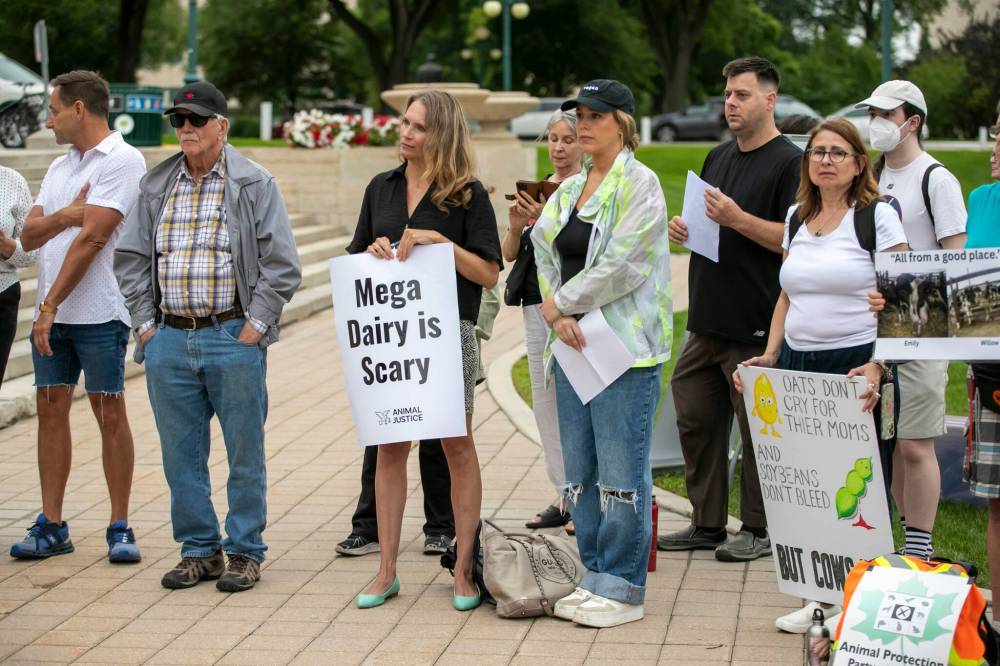Agency agrees to review N.D. mega-farms over Lake Winnipeg pollution fears
Advertisement
Read this article for free:
or
Already have an account? Log in here »
To continue reading, please subscribe:
Monthly Digital Subscription
$0 for the first 4 weeks*
- Enjoy unlimited reading on winnipegfreepress.com
- Read the E-Edition, our digital replica newspaper
- Access News Break, our award-winning app
- Play interactive puzzles
*No charge for 4 weeks then price increases to the regular rate of $19.00 plus GST every four weeks. Offer available to new and qualified returning subscribers only. Cancel any time.
Monthly Digital Subscription
$4.75/week*
- Enjoy unlimited reading on winnipegfreepress.com
- Read the E-Edition, our digital replica newspaper
- Access News Break, our award-winning app
- Play interactive puzzles
*Billed as $19 plus GST every four weeks. Cancel any time.
To continue reading, please subscribe:
Add Free Press access to your Brandon Sun subscription for only an additional
$1 for the first 4 weeks*
*Your next subscription payment will increase by $1.00 and you will be charged $16.99 plus GST for four weeks. After four weeks, your payment will increase to $23.99 plus GST every four weeks.
Read unlimited articles for free today:
or
Already have an account? Log in here »
A cross-border agency has agreed to review the environmental impact of two proposed industrial dairy farms in North Dakota near the Red River, the Manitoba government said Thursday.
Environment and Climate Change Minister Mike Moyes wrote to the International Joint Commission’s Red River Watershed Board in August to share concerns about the mega-barns, which would house 37,500 cows altogether, producing more than seven million kilograms of phosphorus and nitrogen yearly.
The manure runoff would enter the Red River in North Dakota before emptying into Lake Winnipeg, exacerbating the lake’s already-high phosphorus levels and toxic blue-green algae blooms.

BROOK JONES / FREE PRESS
A rally was held at the legislature to oppose two proposed industrial dairy farms in North Dakota near the Red River.
“We are working with partners upstream and taking action at home to ensure developments address the risk of sending even more algae-causing nutrients into Lake Winnipeg,” Moyes said in a news release Thursday. “We must protect Lake Winnipeg for generations to come.”
The International Joint Commission will assess the impact of the farms on the Red River and review permits related to the farms, the release said. The commission did not immediately respond to a request for comment.
James Beddome, the executive director of the non-profit Manitoba Eco-Network, said the interest of the commission was a hopeful step forward.
“We have the experts looking into it, that’s what we’ve been suggesting all along,” he said.
Protests have sparked up on both sides of the border against the farms; in North Dakota, a petition was presented to Gov. Kelly Armstrong calling for collaboration with Manitoba and Minnesota to protect the Red River watershed.
“I don’t think the general public are behind it, both here and in North Dakota, and aren’t our governments supposed to be doing what the general public believes is right?” said Vicki Burns, director of the Save Lake Winnipeg Project.
Burns remains cautious, noting the U.S. government, which has rolled back a number of environmental regulations under President Donald Trump, remains a concerning factor.

BROOK JONES/FREE PRESS
James Beddome, the executive director of the non-profit Manitoba Eco-Network, said the commission’s interest was a hopeful step forward.
“I’m not saying, ‘Oh, great, this problem is solved now,’ because I don’t know how much, given the current state of international affairs, how much weight will be put on the IJC’s review.”
The Richland County Abercrombie Dairy (12,500 cows) and the Traill County Herberg Dairy (25,000 cows) are both owned by Riverview Farms, based in Morris, Minn.
malak.abas@freepress.mb.ca

Malak Abas is a city reporter at the Free Press. Born and raised in Winnipeg’s North End, she led the campus paper at the University of Manitoba before joining the Free Press in 2020. Read more about Malak.
Every piece of reporting Malak produces is reviewed by an editing team before it is posted online or published in print — part of the Free Press‘s tradition, since 1872, of producing reliable independent journalism. Read more about Free Press’s history and mandate, and learn how our newsroom operates.
Our newsroom depends on a growing audience of readers to power our journalism. If you are not a paid reader, please consider becoming a subscriber.
Our newsroom depends on its audience of readers to power our journalism. Thank you for your support.

